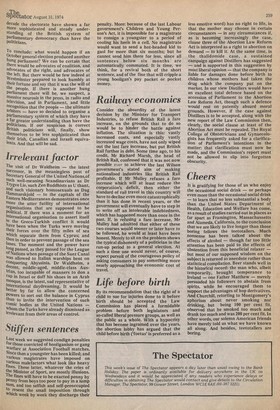Railway economics
Consider the absurdity of the latest decision by the Minister for Transport Industries, to refuse British Rail a fare increase, on the grounds that to do so would be to hinder the battle against inflation. The situation is this: vastly increased costs, and especially vastly increased wage costs, have not only wiped out the last fare increase, but put British Rail further in debt. Some time ago, to his credit, Mr Richard Marsh, the head of British Rail, confessed that it was not now possible ever to achieve the last Wilson government's stated aim of making nationalised industries like British Rail profitable. If Mr Mulley refuses a fare increase which will at least reduce the corporation's deficit, then either the standard of rail travel in this country will have to decline even more catastrophically than it has done in recent years, or the government will eventually have to step in to write off an intolerable indebtedness, which has happened more than once in the past. If, in refusing a fare increase, Mr MuHey had admitted that either of these two courses would sooner or later have to be followed, he would at least have been honest. Merely to sit on the problem shows the typical dishonesty of a politician in the run-up period to a general election. At such a time one would never, of course, expect pursuit of the courageous policy of asking consumers to pay something more nearly approaching the economic cost of travel.


































 Previous page
Previous page